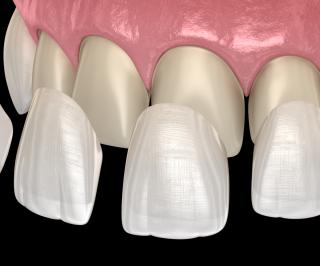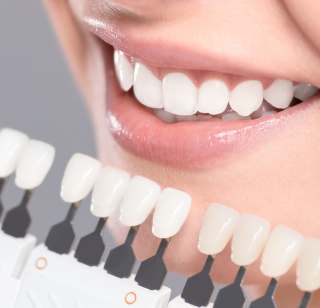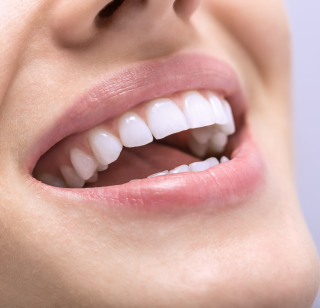Often an alternative to crowns, veneers are very thin pieces of specially-shaped porcelain or composite resin (plastic) that are glued over the front of your teeth with little or no anesthesia needed. They are the cure for teeth that are severely discolored, chipped, have small holes or pits, misshapen or crooked, or for the correction of unwanted or uneven spaces. Unlike crowns, veneers won’t require Anderson Dental to remove much of the tooth itself in most cases. It is important to ask your Doctors of Anderson Dental how much tooth will be removed. In some cases more tooth will need to be removed, which may increase the risk of trauma to the tooth.
Dental Veneers are created from an impression taken in Anderson Dental’s office. Your custom veneer is then glued directly onto your tooth. Typically costing less than crowns, veneers won’t stain, making veneers a very popular solution for many people seeking that perfect smile. Strong and very durable, veneers last from ten to fifteen years, and come in colors that will brighten dark teeth without the worry of them changing color.
In your first appointment it is important to discuss with your dentist that you will want to “try in” your veneers with temporary cement that is the same color cement as will be used for the permanent attachment. During this “try-in” phase, be sure to look at your veneers in natural light in addition to the office light. Teeth are prepared for veneers by lightly buffing to allow for the small added thickness of the veneer. Veneers are thin like contact lenses, and will usually only need tooth reduction of 0.5mm to 1.0mm. If a drastic change is being made for the result you want, reduction may be 1.0mm to 2.0mm. A mold is taken of the teeth, from which the veneers are modeled after. Temporary veneers will be placed and worn until your permanent veneers are ready. While wearing the temporary veneers, advise our Doctors of Anderson Dental of any adjustments or changes you would like made, such as in shape or size. These changes will be translated into your permanent veneers, so good communication between you and our Doctors of Anderson Dental is important in achieving your new smile.
Anderson Dental places the veneers with water or glycerin on the teeth to verify their perfect fit and the shade or color. The color cannot be changed after the veneers are adhered to your teeth. The tooth is then cleansed with chemicals to achieve a durable bond. Once the glue is between the veneer and your tooth, a light beam is used to harden the glue/cement.
The procedure for Lumineers is different than the above traditional porcelain veneers. Still two visits, but there is little to no preparation of the tooth and no need for temporary veneers.
The veneers process is complex and often hard to understand without years of training, but we've outlined what to expect when you're getting teeth veneers.


